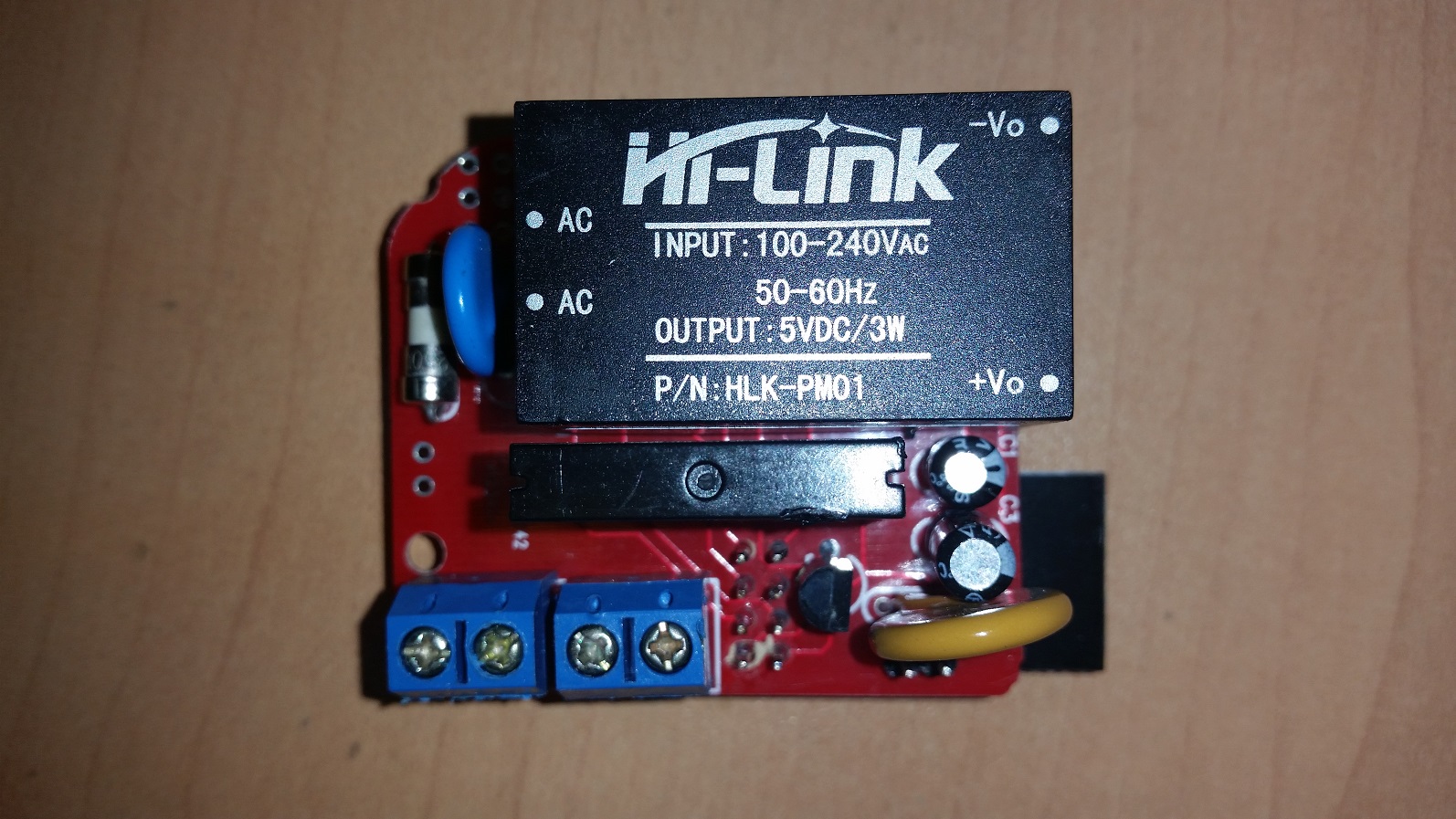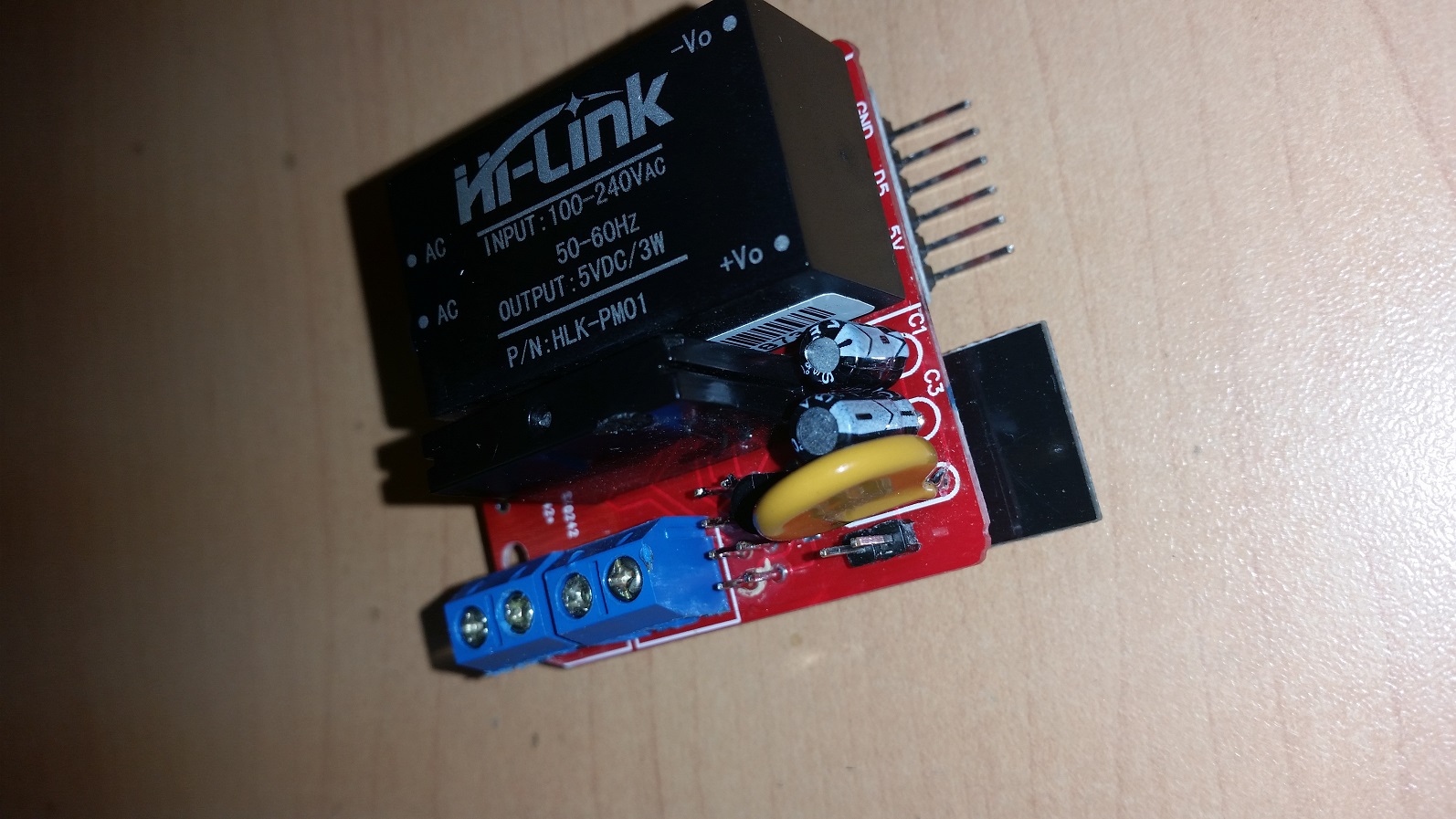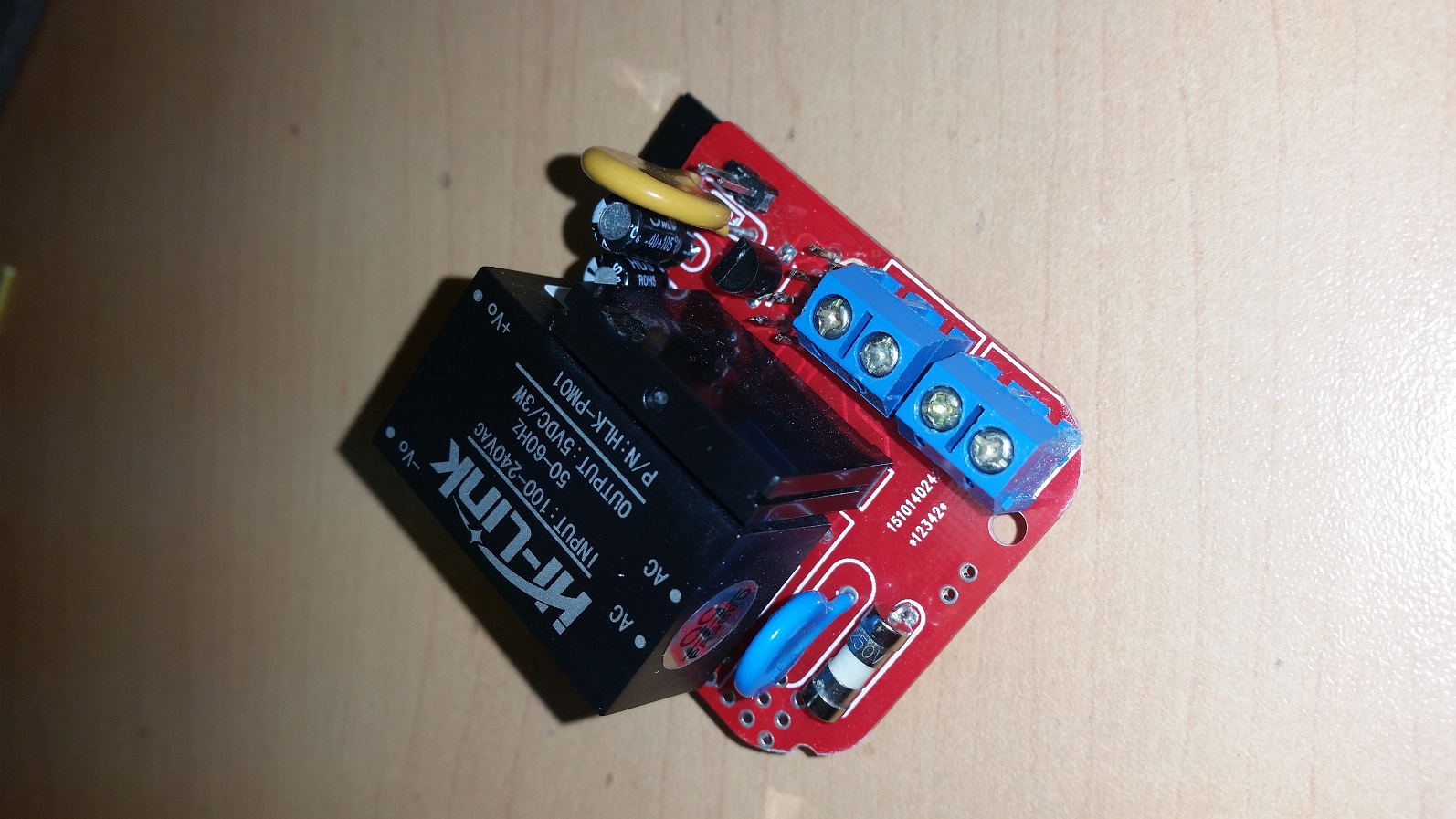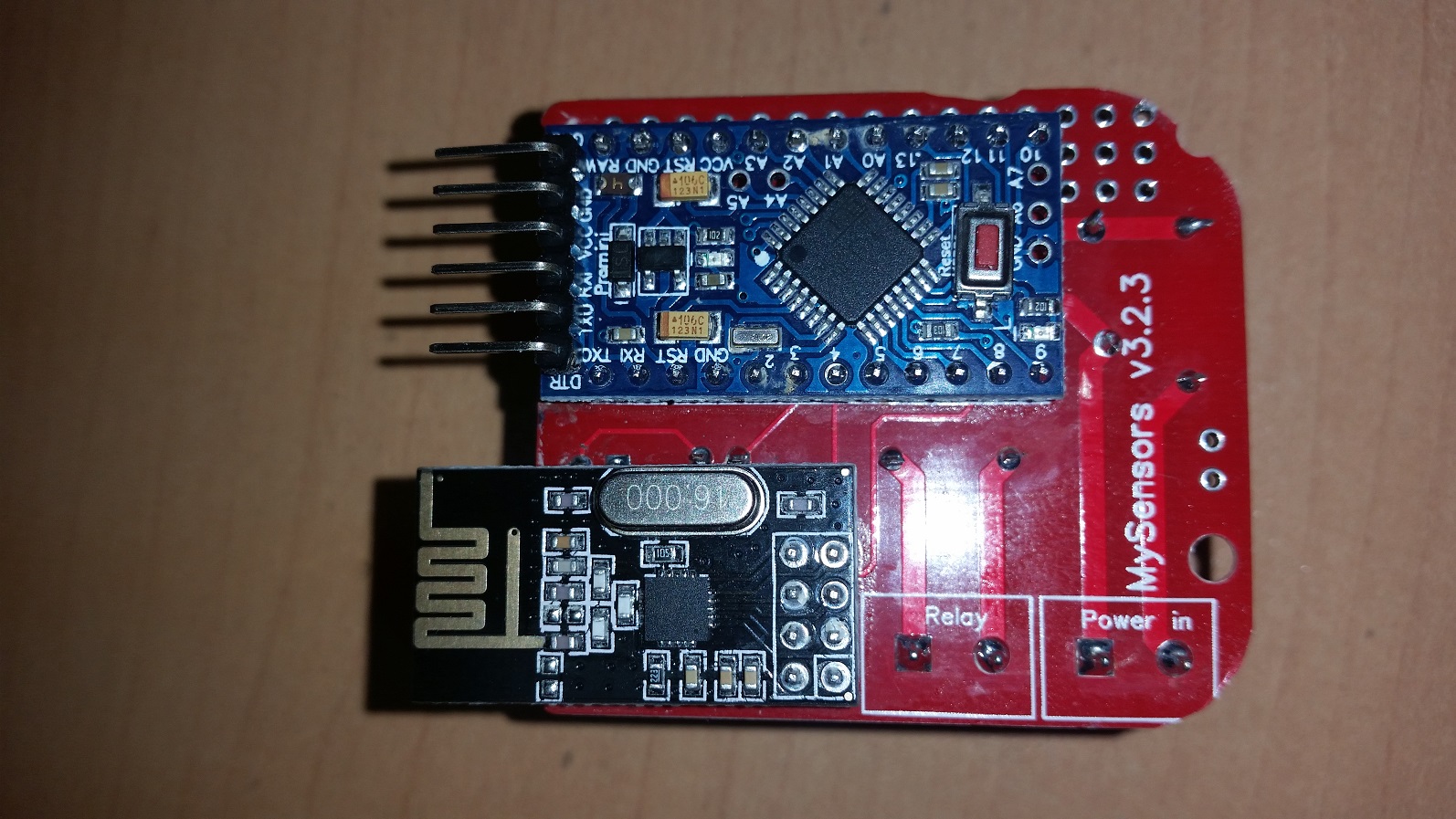110v-230v AC to Mysensors PCB board
-
@aproxx Great job. Just started to work with mysensors and I was looking for a power supply alternative to mobile phone chargers. Though one question; the board that you included the relay was really interesting. Why did you not proceed on this? Also, do you sell the PCB's?
-
@the-cosmic-gate, greetings to you. Kindly let me know, is there any issue with the component placement in the board. Not sure why it's not working :(.
Thanks
Brijesh@Brijesh-Mishra said:
@the-cosmic-gate, greetings to you. Kindly let me know, is there any issue with the component placement in the board. Not sure why it's not working :(.
Thanks
Brijesh
There absolutely nothing wrong, but I want to use the ESP8266 to build in instead of the arduino and 2.4 ghz radio (the ESP8266 is an Arduino incl WiFi) so the PCB can be much smaller I think.
-
@Brijesh-Mishra , I see two issues with your photos. 1) the 3.3V regulator is on backwards. If you earlier in this thread someone comments that the regulator needs to be put on backward. The white design on the board is not correct. That was also my experience with the boards I built. The flat side of the regulator should face the two cap's. 2) more importantly, it appears that you used a thermal fuse in the spot where fuse #1 goes. Fuse #1 is supposed to be a 300ma slo blow fuse. If that is what you have there no problem, but it looks like the thermal discussed in the thread. This board does not have a place for the thermal fuse. I would consider this a serious safety issue, but I am not an expert. Hope this helps.
-
@Brijesh-Mishra , I see two issues with your photos. 1) the 3.3V regulator is on backwards. If you earlier in this thread someone comments that the regulator needs to be put on backward. The white design on the board is not correct. That was also my experience with the boards I built. The flat side of the regulator should face the two cap's. 2) more importantly, it appears that you used a thermal fuse in the spot where fuse #1 goes. Fuse #1 is supposed to be a 300ma slo blow fuse. If that is what you have there no problem, but it looks like the thermal discussed in the thread. This board does not have a place for the thermal fuse. I would consider this a serious safety issue, but I am not an expert. Hope this helps.
@novicit, Thanks a lot for your help. i will make a new board as per your guidance and share the photos soon.
Regards
Brijesh -
-
Hi,
I now received PCBs from DirtyPCB. I'm searching components (but not from China sellers).
Can I use this varistor on the AC side?: http://uk.farnell.com/multicomp/mcsr391k10ds/varistor-60j-250vrms/dp/1856880
And on the DC side?: http://uk.farnell.com/multicomp/mcvz1206m050agt/varistor-multilayer-4vac-0402/dp/2462756Thanks in advance!
-
Hi all,
**UPDATE April 17 2016 **
The latest version of this board is available HERE.After spending a few months on this forum and a few prototypes later, I decided I wanted to build a small but cheap PCB which could be placed in either the wall behind the light switch, or above the lamp.
Besides the boards I've seen on this forum, I wanted these boards to contain a module to go from 230v AC to 5/3.3v DC in order to power an Arduino nano and the NRF module. I eventually ended up with a PCB which is about 4 by 4.5cm. So with all components attached I'm hoping to get in stuffed in a 5x5x3cm plastic printed case.
Modules which I've used to power the board:
[http://www.aliexpress.com/item/5-pcs-HLK-PM01-AC-DC-220V-to-5V-Step-Down-Power-Supply-Module-Intelligent-Household/32319202093.html?spm=2114.32010308.4.19.8oKfZgUPDATE: 2015/09/18
As promised, I've got an update for this project. The board has been tested in the past week, and everything is working as expected. Compared to the previous board I've posted, I have updated the following:
• Solder pads of LE33CZ have been placed a little wider apart to avoid short circuit while soldering.
• Solder pads of the resettable fuse (Fuse2) has been placed closer together to better fit the fuses of the BOM.
• Moved the NRF24L01 connector a bit away from the solid state relay. Should make it easier to solder.
• Moved Fuse2 to another location on the board, away from the 230v circuit.Some 3D pictures (Top and bottom):
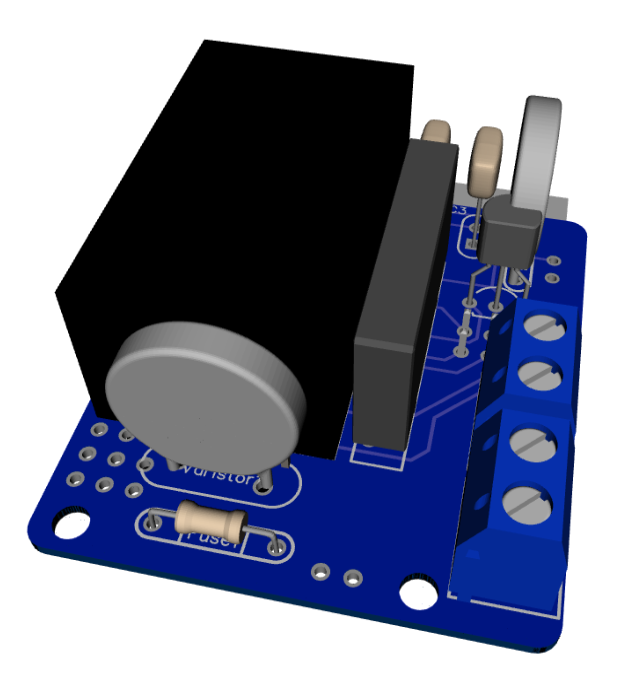
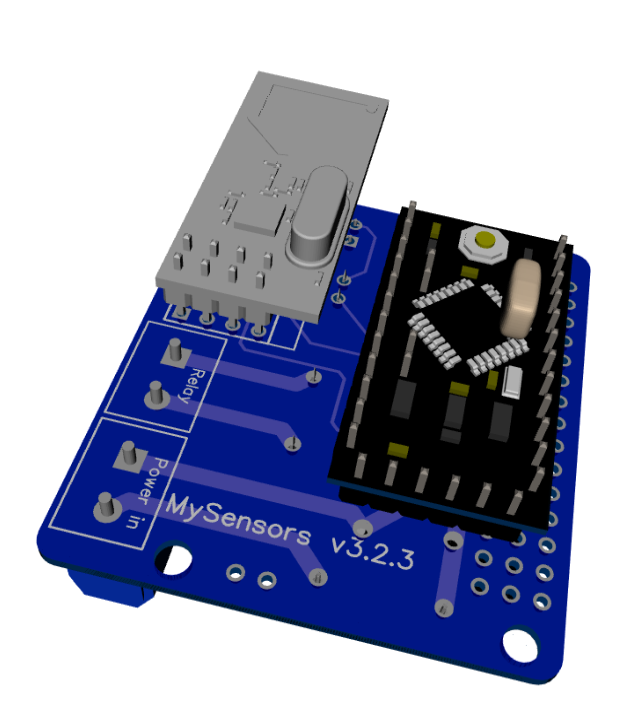
Anyone who is interested can order the PCB HERE
Some documentation, complete list of required components and all gerber / DipTrace files (in case you would like to make some modifications) can be found here: MySensors board v3.2.3.zip.
@aproxx hi wonderful design , i was going to make a similar but i can't find EAGLE part and footprint
for HLK-PM01 ,and actually i don't know how to design the part library .
so please if you can share it i will be thankful -
@punter9 check our hardware site openhardware.io
-
thanks! one more question. I am really striking out finding resettable fuses for 120v US application. Anybody conquer this mole hill?
@punter9 said:
thanks! one more question. I am really striking out finding resettable fuses for 120v US application. Anybody conquer this mole hill?
I don't remember where I read this but it was advised not to use resettable fuses with the HLK. Basically it was said that if the fuse were to blow the HLK would have already been stressed to the point where it may be unsafe and it's best to replace the whole device. I wish I could remember where I read that but I'm not sure...
-
@punter9 said:
thanks! one more question. I am really striking out finding resettable fuses for 120v US application. Anybody conquer this mole hill?
I don't remember where I read this but it was advised not to use resettable fuses with the HLK. Basically it was said that if the fuse were to blow the HLK would have already been stressed to the point where it may be unsafe and it's best to replace the whole device. I wish I could remember where I read that but I'm not sure...
@petewill said:
I don't remember where I read this but it was advised not to use resettable fuses with the HLK. Basically it was said that if the fuse were to blow the HLK would have already been stressed to the point where it may be unsafe and it's best to replace the whole device. I wish I could remember where I read that but I'm not sure...
I'm 90% certain that was from the guy who did the power tests of the HLK. I believe he was saying that these small PSU's don't handle heat or spikes well and if the fuse goes, you should assume the PSU is unsafe as well and replace it. I think it was in a thread that he was replying to on a different forum but I could be wrong.
-
@petewill said:
I don't remember where I read this but it was advised not to use resettable fuses with the HLK. Basically it was said that if the fuse were to blow the HLK would have already been stressed to the point where it may be unsafe and it's best to replace the whole device. I wish I could remember where I read that but I'm not sure...
I'm 90% certain that was from the guy who did the power tests of the HLK. I believe he was saying that these small PSU's don't handle heat or spikes well and if the fuse goes, you should assume the PSU is unsafe as well and replace it. I think it was in a thread that he was replying to on a different forum but I could be wrong.
@TD22057 said:
@petewill said:
I don't remember where I read this but it was advised not to use resettable fuses with the HLK. Basically it was said that if the fuse were to blow the HLK would have already been stressed to the point where it may be unsafe and it's best to replace the whole device. I wish I could remember where I read that but I'm not sure...
I'm 90% certain that was from the guy who did the power tests of the HLK. I believe he was saying that these small PSU's don't handle heat or spikes well and if the fuse goes, you should assume the PSU is unsafe as well and replace it.
Here it is I guess: http://lygte-info.dk/review/Power Mains to 5V 0.6A Hi-Link HLK-PM01 UK.html
Quote: "I would place a fuse or fusible resistor before the converter, the fuse is not supposed to be replaceable, when it blows it is time to replace the converter."
-
@TD22057 said:
@petewill said:
I don't remember where I read this but it was advised not to use resettable fuses with the HLK. Basically it was said that if the fuse were to blow the HLK would have already been stressed to the point where it may be unsafe and it's best to replace the whole device. I wish I could remember where I read that but I'm not sure...
I'm 90% certain that was from the guy who did the power tests of the HLK. I believe he was saying that these small PSU's don't handle heat or spikes well and if the fuse goes, you should assume the PSU is unsafe as well and replace it.
Here it is I guess: http://lygte-info.dk/review/Power Mains to 5V 0.6A Hi-Link HLK-PM01 UK.html
Quote: "I would place a fuse or fusible resistor before the converter, the fuse is not supposed to be replaceable, when it blows it is time to replace the converter."
@HenryWhite it mean that appart if you make a direct shortcut with a metal part, the only thing that came make the fuse blow, it is because of the HLK part.
So: fuse blow = HLK dead.
HLK dead = you don't need a resettable fuse, as you have to unsolder the HLK to repair the board (if no component seam to be dead after this one). -
Hi and thanks for sharing your project!!! I'm new here and up to now I've been using Fritzing as PCB design tool. I'm impressed with the 3D preview of diptrace. I've imported your project since is almost what I need, but I need some changes: ESP8266 (E-12/E-04) instead or Arduino and Relay instead of SSR.
When I import your project I can't see 3D preview of HLK. How do I import this 3D part? Where's can I find the Songle Relay part that has been shown above?
Just one more question: why do you use NRF24L01 + Arduino if you can do the same and more with ESP8266?? :o/
Thanks again and best regads!!!
P.S.
I'll share my PCB if you wish.
-
Hi all,
**UPDATE April 17 2016 **
The latest version of this board is available HERE.After spending a few months on this forum and a few prototypes later, I decided I wanted to build a small but cheap PCB which could be placed in either the wall behind the light switch, or above the lamp.
Besides the boards I've seen on this forum, I wanted these boards to contain a module to go from 230v AC to 5/3.3v DC in order to power an Arduino nano and the NRF module. I eventually ended up with a PCB which is about 4 by 4.5cm. So with all components attached I'm hoping to get in stuffed in a 5x5x3cm plastic printed case.
Modules which I've used to power the board:
[http://www.aliexpress.com/item/5-pcs-HLK-PM01-AC-DC-220V-to-5V-Step-Down-Power-Supply-Module-Intelligent-Household/32319202093.html?spm=2114.32010308.4.19.8oKfZgUPDATE: 2015/09/18
As promised, I've got an update for this project. The board has been tested in the past week, and everything is working as expected. Compared to the previous board I've posted, I have updated the following:
• Solder pads of LE33CZ have been placed a little wider apart to avoid short circuit while soldering.
• Solder pads of the resettable fuse (Fuse2) has been placed closer together to better fit the fuses of the BOM.
• Moved the NRF24L01 connector a bit away from the solid state relay. Should make it easier to solder.
• Moved Fuse2 to another location on the board, away from the 230v circuit.Some 3D pictures (Top and bottom):


Anyone who is interested can order the PCB HERE
Some documentation, complete list of required components and all gerber / DipTrace files (in case you would like to make some modifications) can be found here: MySensors board v3.2.3.zip.
@aproxx said:
Hi all,
After spending a few months on this forum and a few prototypes later, I decided I wanted to build a small but cheap PCB which could be placed in either the wall behind the light switch, or above the lamp.
Besides the boards I've seen on this forum, I wanted these boards to contain a module to go from 230v AC to 5/3.3v DC in order to power an Arduino nano and the NRF module. I eventually ended up with a PCB which is about 4 by 4.5cm. So with all components attached I'm hoping to get in stuffed in a 5x5x3cm plastic printed case.
Modules which I've used to power the board:
[http://www.aliexpress.com/item/5-pcs-HLK-PM01-AC-DC-220V-to-5V-Step-Down-Power-Supply-Module-Intelligent-Household/32319202093.html?spm=2114.32010308.4.19.8oKfZgUPDATE: 2015/09/18
As promised, I've got an update for this project. The board has been tested in the past week, and everything is working as expected. Compared to the previous board I've posted, I have updated the following:
• Solder pads of LE33CZ have been placed a little wider apart to avoid short circuit while soldering.
• Solder pads of the resettable fuse (Fuse2) has been placed closer together to better fit the fuses of the BOM.
• Moved the NRF24L01 connector a bit away from the solid state relay. Should make it easier to solder.
• Moved Fuse2 to another location on the board, away from the 230v circuit.Some 3D pictures (Top and bottom):


Anyone who is interested can order the PCB HERE
Some documentation, complete list of required components and all gerber / DipTrace files (in case you would like to make some modifications) can be found here: MySensors board v3.2.3.zip.

